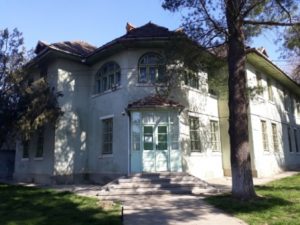Interview: Soft Revolution – zine culture
1. Hello, welcome on Teen Art Out! I hope it’s a nice day for you.
Let’s start from the beginning: how was the idea of starting Soft Revolution born? At first glance, one could say that Italy is somehow static when it comes to “zines”.
MARTA: A few years ago, our friend Margherita Ferrari wrote to us, pointing out that there was no Italian magazine for girls, considered as beings capable of thinking. We thought about building up a project, taking inspiration from international magazines such as Bitch or Bust.
Its “zine”-ish nature has been partially lost with the course of time, but we’ve published physical zines as well, which better represent the original project.
The whole “zine” culture was never big in Italy, especially if we talk about feminist products, but it looks like the situation is evolving, since the Internet has introduced more people to this world.
2. It might sound trite, but where does your name come from? For revolutionary magazines even a simple title can become a source of strength. By the way, the postscript “girls that should calm down” perfectly sums up the politics of your written pieces.
VALERIA: Finally someone asks us! This question is usually forgotten. It’s the title of a song from the Canadian band Stars (form the album “Set Yourself on Fire”). A song the three of us loved and that later ended up representing fully what we do. You know, “chase the demons out of town” and that sort of things.
“Girls that should calm down”is a self-deprecating way to describe ourselves and, now, the rest of the editorial staff. We have no interest in creating barren laments regarding what we observe in society and which we want to change: we’re for action and bravery, respect and awareness. They wish we were calm, but we have no intention of doing that. That’s all.
3. Is there a specific reason why you think that this sort of (not only) feminist activity is finally happening in Italy too? You’ve been talking a lot about “feminism in pop culture” on your zine: could this be, in the good and in the bad, one of the most effective instruments to favour a potential and consequent approach to a more radical type of feminism?
MARTA: I guess there are some who like to believe that the resurrection of feminism derives strictly from academies and not from “pop feminism”. I wonder if it’s really that unacceptable that many people are getting close to feminism through, say, Beyoncé, and then start getting interested in the movement itself and what it truly means.
In Italy everything is slowed down, but I think that more and more young women are getting tired of being pushed down and living trapped inside the patriarchy’s limits. I also think that the constant access to the Internet and to English-speaking media is hugely responsible for this slow awakening.
4. What’s your main inspiration? Be it a way of thinking (on which SoftRev was based) or a celebrity; an historical figure or a place…
VALERIA: “Some people say little girls should be seen and not heard, but I think Oh bondage up yours” – that’s a pretty clear sum-up. Poly Styrene (from X Ray Spex) said it right.
5. Likewise, what do you think is the biggest source of influence for today’s Italian youth? Or why the queer feminist journalism movement is a rather unseen pearl?
VALERIA: From what I can see, TV still has the biggest impact on young people. TV and Facebook. My impression is that queer and feminism journalism works mostly online, but, unless it is aggressively shown on social networks, I fear it will always keep a limited visibility to the mainstream public. In Italy young people are less used to looking on the Internet for something that represents them; that can talk directly to them and that is about them.
6. What’s the book, or any other kind of art form, that has been essential to your decision of becoming active and starting this project?
VALERIA: As we’ve said, girls magazines published in the USA, such as Sassy or Bitch have been decisive. They were, and are, editorials that go straight to the reader’s heart, touching usually ignored topics (starting from body and sexuality), making you feel less alone, less stupid, and more understood.
7. What’s the issue, the topic, the article or the interview you’re the most proud of? The one which had the biggest impact?
MARTA: It’s an impossible choice. We published more than 1200 articles and there are a lot which I deeply loved. Among the ones I wrote, the one that had the biggest impact was “Being Fat In Summer”, but my favourite has been the interview I did with my idol, Bianca Pitzorno [an Italian writer,]
8. Is there anything that you haven’t done yet, but that you can’t wait to face, magazine-wise? Who would you love to work with, if anything was possible?
VALERIA: There are a lot of Italian figures, as well as international ones, we’d like to work with, meet or even simply see from a distance. I’d love to meet some “colleagues”:Tavi Gevinson or Hazel Cills or Mey (Trans editor from Autostraddle), just to name a few.
MARTA: Roxane Gay, even if I don’t think I’d come out alive.
9. What is it like, the typical SR staff daily routine?
VALERIA: We don’t really have a physical place where we meet to work together. We live in London and in Turin. The rest of the staff lives in France, UK, Australia, Germany, and Italy. We communicate through emails or social networks. Our smartphones are always beep-ing, basically.
I personally work on SR as soon as I have a free moment from my other job (at a communication agency).
10. In your experience, what are the first small steps that anyone can make in order to create something that will manage to fit in into both the feminist and wide public community (reached by SoftRev many times)? Or, on the contrary, do you think that the borders, as bell hooks states, are the best place for the resistance?
MARTA: Firstly, I think that any form of activism is valid. Personally, I find satisfying trying to reach a wide public as possible, but I’m not sure that this doesn’t place us on the borders anyway.
To anyone who wants to start a feminist project that is thought to reach a public (and not only other feminists), I’d start by saying to ponder if they think they can do it. I don’t think it’ll come as a surprise if I say that at least once a week we get an email or a comment that are offensive and that make me want to smash everything and close our website. A wider public is also more hostile.
VALERIA: Anyhow, if you think you want to jump into this, starting a community is the first thing. Find people like you, debate on topics that you usually can’t discuss but that are close to your heart, and start including strangers into this circle. Be curious, friendly and, mostly, have fun. Light words will be helpful when everything will be shitty, as Marta said.
12. What are the most difficult sides of a magazine that wants to educate, in/form, analyze and destroy many of the clichés and taboos of the modern Italian (and international) culture?
VALERIA: Sometimes, very often, we hit sensitive nerves, we denounce social phenomena that are, by now, so crystallized inside people’s minds that they bring onto us, almost automatically, criticism and jokes (on the lines of “what the heck are you saying?”), even from some of our most affectionate readers.
This can make you very insecure, especially if an article on which you’ve put a lot of effort receives a lot of negative criticism. But we’ve learnt to gain strength from these moments, making our discussing abilities grow, in order to be able to withstand confrontations as much as possible, and to manage to cut down even the most intransigent souls.
13. How do you interpret the feedback you’ve gotten, and are still getting, from the Italian public during the course of this adventure?
VALERIA: It’s essentially positive feedback, and this, apart from making us very happy, is enough to pay back for the huge effort that sits behind the Soft Revolution System. We’ve made new friends, met many people who share our ideas and views on society. Considering the fact that we’ve started this project in order to feel “less isolated” from our little town realities, I’d say it’s really a good moment.
Lastly, I’d like to thank you for the huge work you do: it’s essential to say the least. Thank you so much for your time! Have a nice day.
Thank you!


